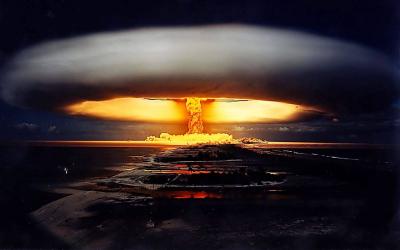Instead of stockpiling weapons and stirring fears of an impending nuclear conflict, Britain should focus on maintaining peace.
In our increasingly unstable present, it is hard not to see echoes of the period leading up to World War I. At that time, the confrontation between two blocs of great powers led to the belief that a catastrophic war was unavoidable. The repetition of such a scenario could prove that the nuclear hell that could engulf human civilization is the most likely outcome. In two journalistic articles last week, Sir Keir Starmer committed the Labour Party to retaining nuclear weapons and raising defense spending to 2.5% of GDP, despite the Labour Party's statements in 2017 and 2019 promising to keep defense spending at a minimum of 2%, which NATO members commit to reaching.
But the truth is that this country cannot have a reasonable discussion about defense. The Ministry of Defence is not far from George Orwell’s Ministry of Peace, as the word “defence” in practice means “attack.” Although our media and political climate makes these policy and spending proposals seem like utopian values, the real approach may look somewhat different.
First, we must abandon the creeping fatalism regarding the next war. More than half of Britons believe that another world war is likely in the next five to ten years, while 59% believe that nuclear weapons will be used if it breaks out. The collective surrender to nuclear annihilation seems to me a problem. This fatalism has been fueled by declarations from senior military officials that we must prepare for total war with Russia in the coming two decades, while Defence Secretary Grant Shapps urges us to be ready for other wars involving China, Russia, Iran, and North Korea. Moreover, General Sir Patrick Sanders, head of our army, calls for society to be put in a state of war. Greater consideration must be given to de-escalation rather than repeating the mistakes of the pre-World War I era.
Secondly, we must prevent the repetition of the catastrophic “intervention” wars of the 21st century, which led to the deaths of 636 British service members (in Iraq and Afghanistan) and made us less secure—along with destabilizing Iraq, Afghanistan, Libya, and others. British intelligence warned that "the threat from Al-Qaeda" and "other Islamic terrorist groups" would increase if Iraq was invaded, while we know that the war in Libya played a pivotal role in spreading extremism in the Manchester Arena bombings.
Certainly, Israel's war in Gaza, which the United Nations has described as a potential genocide, will prove to be one of the greatest events of mass extremism in our time, and British complicity will expose us to deadly consequences. It is hard to argue that these wars were for “defence.” Deterrence against terrorism is, in fact, a fundamental element of national security: abandoning offensive wars and supporting mass atrocities is essential to achieving that.
Britain should reduce its defense spending, limiting it to actual defence, or protection against invasion, humanitarian disaster assistance, and international peacekeeping operations. As Richard Reeve, a coordinator at the research center “Re-thinking Security,” puts it, “other middle powers,” like Japan, Germany, Italy, and Canada, do not make global military claims. He asks: “Why do we believe we have the right and responsibility to act at the global level despite the constraints on our resources and legal norms?”
It is true that NATO membership calls for spending at least 2% of GDP on weapons, but in practice, most countries ignore that. The real threats facing Britain include pandemics, as you may recall, and cyber-attacks. Helping to stoke an arms race and surrendering to a future global fire will not be an effective means of protecting our national security if it leads to nuclear annihilation.




